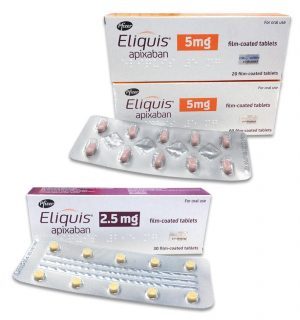- Home
- Editorial
- News
- Practice Guidelines
- Anesthesiology Guidelines
- Cancer Guidelines
- Cardiac Sciences Guidelines
- Critical Care Guidelines
- Dentistry Guidelines
- Dermatology Guidelines
- Diabetes and Endo Guidelines
- Diagnostics Guidelines
- ENT Guidelines
- Featured Practice Guidelines
- Gastroenterology Guidelines
- Geriatrics Guidelines
- Medicine Guidelines
- Nephrology Guidelines
- Neurosciences Guidelines
- Obs and Gynae Guidelines
- Ophthalmology Guidelines
- Orthopaedics Guidelines
- Paediatrics Guidelines
- Psychiatry Guidelines
- Pulmonology Guidelines
- Radiology Guidelines
- Surgery Guidelines
- Urology Guidelines
Apixaban -A safer anticoagulant for AF patients on dialysis: Circulation Study

Read Also: Apixaban as safe as warfarin during catheter ablation of AF
For the study, the research team studied patterns of apixaban use and associated outcomes in more than 25,000 Medicare beneficiaries as a research project undertaken by a team at the United States Renal Data System (USRDS) Coordinating Center, based at the University of Michigan. During the study period, apixaban was increasingly used and about 1 in 4 new blood thinner prescriptions in 2015 were for apixaban.
The study population consisted of 25,523 patients (45.7% women; age 68.2±11.9 years), including 2,351 patients on apixaban and 23,172 patients on warfarin.
Key Findings:
- In matched cohorts, there was no difference in the risks of stroke/systemic embolism between apixaban and warfarin, but apixaban was associated with significantly lower risk of major bleeding.
- In sensitivity analyses, standard dose apixaban (5 mg twice a day; n=1,034) was associated with significantly lower risks of stroke/systemic embolism and death as compared with either reduced dose apixaban (2.5 mg twice a day; n=1,317) or warfarin (HR 0.64, 95% CI 0.42-0.97, for stroke/systemic embolism; and HR 0.63, 95% for death).
- The risk of major bleeding was about 30 percent less for those on apixaban compared to warfarin.
"Atrial fibrillation is a pretty significant determinant of adverse outcomes in this population," Siontis says. "It's a common problem in dialysis patients who generally have a lot of comorbidities. And the patients on dialysis who have Afib experience higher rates of stroke compared to patients with Afib who aren't on dialysis."
"Patients on dialysis are one of the most challenging populations, because they have many comorbid conditions, are often on many prescription drugs and are at significant risk of kidney failure associated and treatment-related adverse events," says senior co-author Rajiv Saran, M.D., a nephrologist at Michigan Medicine and director of the USRDS Coordinating Center at U-M. "Dialysis patients were excluded from all randomized trials that established the utility of the newer anticoagulants including apixaban."
In the general population, apixaban has been used safely and widely, Siontis says.
"It's one of the agents that's been successful in the general population, but we know very little about dialysis patients specifically," he says, despite FDA approval of updated labeling for apixaban in dialysis patients."
Based on the study, the authors concluded that among ESKD patients with AF on dialysis, apixaban use may be associated with lower risk of major bleeding compared with warfarin, with a standard 5 mg twice a day dose also associated with reductions in thromboembolic and mortality risk.

Disclaimer: This site is primarily intended for healthcare professionals. Any content/information on this website does not replace the advice of medical and/or health professionals and should not be construed as medical/diagnostic advice/endorsement or prescription. Use of this site is subject to our terms of use, privacy policy, advertisement policy. © 2020 Minerva Medical Treatment Pvt Ltd